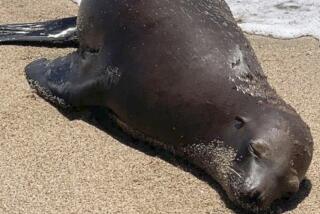Cecil the lion’s killer is not alone: Trophy hunters disproportionately Americans
A beloved lion who usually roamed within the confines of an African conservation park is dead. An American dentist on a hunting trip in Zimbabwe is the one who killed the animal. Many people are outraged.
The death of Cecil the lion also has some asking questions about the sizable role U.S. citizens play in the controversial sport of slaying wildlife for trophies.
NEWSLETTER: Get the day’s top headlines from Times Editor Davan Maharaj >>
“Americans are among the most bloodthirsty among citizens of the world when it comes to trophy hunting, in particular lions and elephants,” said Jeff Flocken, North American regional director for the International Fund for Animal Welfare. “It’s a small group of privileged Americans. Eighty percent or more of Americans want to see endangered species protected.”
A $55,000 hunt
Cecil, a well-known lion with a distinctive black mane, was reportedly killed July 1 by crossbow just outside Zimbabwe’s Hwange National Park.
According to news reports citing Zimbabwean authorities, Walter James Palmer, a dentist from Bloomington, Minn., paid about $55,000 for the hunt. Palmer has denied any wrongdoing, saying in a written statement that to his knowledge everything about his trip “was legal and properly handled and conducted.”
In March, U.S. Fish and Wildlife Service Director Dan Ashe acknowledged that U.S. citizens make up “a disproportionately large share of foreign hunters who book trophy hunts in Africa.” Ashe noted that this activity provides the host countries with a way to manage their wildlife populations and support conservation efforts.
Laury Parramore, a spokeswoman with the Fish and Wildlife Service, told the Los Angeles Times on Tuesday that, though the agency does not keep track of the number of Americans who book trophy hunting trips in Africa, it does count those who apply for permits to import their trophies. That figure, however, was not readily available, Parramore said.
An undesirable trend
Wildlife conservationists see what they describe as an undesirable trend.
According to data from the International Fund for Animal Welfare, the U.S. is the world’s largest importer of African lion parts for trophies and for commercial purposes. Between 1999 and 2008, U.S. citizens claimed 64% of the international market for lion parts. The data show that number has been increasing.
Flocken said the slaying of Cecil was particularly troubling because of the sharp decline in African lion populations, which have dropped nearly 60% in the last three decades. In addition, the killing of a dominant male in a pride, like Cecil, could result in the deaths of others in the group, Flocken said. Males from other prides who might be interested in the open leadership position created by Cecil’s death could attack other males, cubs and protective females.
Charges in the case
Theo Bronkhorst, the professional hunter with Bushman Safaris, which guided Palmer’s safari, and Honest Trymore Ndlovu, owner of Antoinette Farm, where Cecil was shot, are both facing criminal poaching charges. Cecil’s killing was illegal because neither Bronkhorst nor Ndlovu had permission to kill a lion, authorities said.
As part of conservation efforts, hunting licenses often restrict the type and quantity of animals that may be killed.
The Associated Press reported Tuesday that Bronkhorst and Ndlovu were expected to appear in court Wednesday and that authorities were searching for Palmer, who also faces poaching charges.
Parramore said the U.S. Fish and Wildlife Service was “looking into the facts” of the lion’s killing and “working with the Zimbabwean government as requested.”
‘Deep regret’
Palmer has since expressed “deep regret” that his actions led to the death of Cecil, who according to the AP was skinned and beheaded.
“I had no idea that the lion I took was a known, local favorite, was collared and part of a study until the end of the hunt,” Palmer said in a statement. “I relied on the expertise of my local professional guides to ensure a legal hunt.”
This has not quieted his critics, who took to social media with attacks, including condemnation of his dental practice on Twitter, Facebook and Yelp.
An online petition asking the American Dental Assn. to suspend Palmer had more than 1,400 signatures by Tuesday afternoon, and a petition demanding justice for Cecil had more than 166,000 signatures by late Tuesday.
Palmer’s hunting practices have come under scrutiny in the past. In 2008, he pleaded guilty to one count of making material false statements in relation to a poaching case in Wisconsin. He was sentenced to one year probation and a $2,938 fine and was forced to forfeit the black bear remains to the government.
Times staff writers Christine Mai-Duc and Rene Lynch contributed to this report.
Twitter: @AMSimmons1
ALSO:
How Virgin Galactic’s spaceship pilot survived a 10-mile fall back to Earth
What’s behind the frenzy of stunts and accusations among GOP candidates? The Aug. 6 debate
Donald Trump’s attorney apologizes for saying ‘you can’t rape your spouse’
More to Read
Sign up for Essential California
The most important California stories and recommendations in your inbox every morning.
You may occasionally receive promotional content from the Los Angeles Times.











